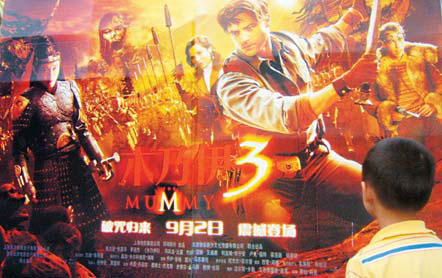


Veteran projectionist Ying Gang found new joy in his work when the first Hollywood blockbuster was imported to China in 1994.
"I felt so proud when my friends and relatives eagerly begged me to get them tickets to The Fugitive," the 55-year-old recalls. "It was the first time I'd ever seen so many people flocking to cinemas and waiting in line outside at midnight."
The Warner Bros' flick was the first revenue-sharing film on the mainland and it shook up the Chinese market. It showed in six cities, including Beijing, Shanghai, Tianjin and Guangzhou, and raked in a record 25 million yuan in box office returns.
The State Administration of Radio, Film and Television, faced with a stagnant film market in 1994, authorized China Film Group's proposal to import 10 foreign revenue-sharing films annually, using the profit to expand the industry in underdeveloped and remote areas.
The first batch of imported flicks included three Jackie Chan movies and seven other Hollywood productions, such as The Fugitive, The Lion King, Speed, Forrest Gump and True Lies.
They occupied 70 percent of the market over the next year, while about 100-odd domestic features took the rest.
"My salary increased from bonuses I was awarded after those films came to theaters and I no longer wanted to quit my job," says Ying, who was then working in the Worker Cultural Palace's theater in Beijing's Haidian district.
Other foreign movies reached China before The Fugitive, but most were low-budget productions as much as a decade old by the time they arrived on the mainland. Few people visited theaters during the Chinese film industry's transition period in the 1980s.
"People liked to go to ballrooms or videogame halls," Ying says.
"Sometimes there would be small audiences in theater and the ticket revenue couldn't cover the costs of electricity and service. We had to persuade the visitors to leave and come back for the next showing, when there would be enough people."
Ying started his career in the 1970s in Changshan, Zhejiang province, where he spent time as an educated youth working in the countryside during the "cultural revolution" (1966-76).
"You can't imagine more than 2,000 villagers crowding into a small compound to watch the so-called soap operas," he says.
Ying was popular because he was responsible for seating.
But a decade later the film industry sagged. "My sense of job security was totally gone in the 1980s," he says.
He came to Beijing in the 1990s.
"It was Hollywood blockbusters that revitalized the market."
Most Chinese will never forget 1998, the year of Titanic.
The film set a historical record, grossing 3.2 billion yuan - 20 percent of the total for all films that year.
A 1998 survey covering Beijing, Shanghai and Guangzhou showed 35 percent of the 1,500 18-year-old respondents named Titanic as their favorite film according to http://www.china.org.cn.
New theaters
Hollywood blockbusters' popularity led to many Chinese cinemas upgrading, as most required state-of-the-art audio and visual facilities. Big cinemas made vast improvements to grab more market share, while smaller ones that failed to do so shut their doors.
From the early 1990s until the new millennium, the number of Chinese cinemas dropped from 15,000 to 4,000. The shabby theater Ying worked in closed shop in 1996.
Ying's 24-year-old son grew up in the Chinese generation that watched films in top-notch theaters with comfortable seats, and food and beverages.
"He went to theaters twice a month and asked for 700 yuan a year to watch films in middle school," Ying says.
"He is an excellent film critic and what he learned helped him adapt to his new life at Louisiana Tech University."
Following Titanic's footsteps, high-profile films such as Harry Potter, The Lord of the Rings, Saving Private Ryan, Pirates of the Caribbean, Batman, Transformers and King Kong clinched Hollywood's dominance over the Chinese market, generating handsome returns in the process.
Between 1995 and 2001 China imported 134 Hollywood films, 61 of which were so-called "profit share" deals, with guaranteed showings in major cinema chains.
"I love watching Hollywood blockbusters. They provide me with audio and visual enjoyment that domestic films cannot," says 26-year-old Chen Qiang, who works at a Beijing joint venture.
Pressured by Hollywood's success, domestic moviemakers and critics sharpened the debate on developing the domestic film industry.
Internationally renowned director Zhang Yimou's 2002 film Hero set a record with box office receipts accounting for 2.5 billion yuan out of total box office revenue of 9 billion yuan for all movies in China that year. It heralded a new era in Chinese filmmaking, one marked by a single-minded push for market success.
China's film industry also benefited from the general market shift that came with the country's 2001 WTO accession.
China's WTO commitments allow up to 49 percent foreign investment in the construction and renovation of movie theaters and video and sound recording distribution, excluding motion pictures. In addition China must allow 20 foreign film imports on a percentage rental basis a year - twice the previous number.
The commitment to allow foreign investment in the industry, which the government has largely honored, has given Chinese domestic companies greater leeway to acquire the knowledge and capital needed to compete with the Hollywood juggernaut.
"Chinese people today don't just want special effects, but also funny or touching stories," a Beijing New Century Cinema manager says. He added that pure romantic stories, such as Atonement, are not well received.
He also pointed out the hit film Kung Fu Panda, released this June, demonstrated that Hollywood has developed more expertise in incorporating Chinese elements.
"That may be a trend in the future," he says.
(China Daily 12/15/2008 page6)













